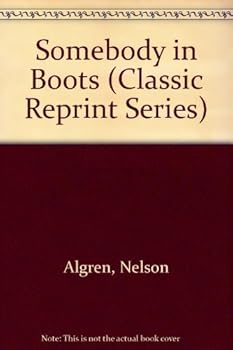Somebody in Boots
Select Format
Select Condition 
Book Overview
Cass McKay, 'a man alienated from family and faith, illiterate and utterly displaced,' leaves his poverty-stricken hometown in search of work, riding the rails from El Paso to Chicago, drifting from... This description may be from another edition of this product.
Format:Paperback
Language:English
ISBN:0938410407
ISBN13:9780938410409
Release Date:January 1987
Publisher:Thunder's Mouth Press
Length:256 Pages
Weight:0.74 lbs.
Dimensions:0.8" x 5.4" x 8.5"
Customer Reviews
1 rating
Grim
Published by Thriftbooks.com User , 24 years ago
This novel precedes the "Grapes of Wrath" by four years, and if not for its relentless misery unleavened by the comic humanity of Steinbeck's masterpiece, it might have been the defining novel of the Depression. That a 24-year-old could have written it as a first novel I find astonishing. To read it is to glimpse an America with one foot still in the nineteenth century and one placed in the maelstrom that brought the second world war and the welfare state.Cass McCay, the hero, is one of the landless, unlettered, unloved, underfed, lonely drifters of the Depression, what Algren called a Final Descendant of the South, one of the "wild and hardy tribe that had given Jackson and Lincoln birth...slaveless yeomen who had never cared for slaves or land..." He explains in the Preface: "Nobody owned a man who owned a gun along the wild frontier. But now that the frontier was gone, where did the man go?"Cass is the offspring of one of those who have nowhere to go. In the Rio Grande valley of West Texas Cass lives in a shack "like a casual box on the border; wooden and half-accidental" with his brother and sister and father. They live a life about a half step up from that of a family of coyotes, eating only oatmeal or rice for days on end, scrounging coal from halted boxcars, taking turns to go get what the "Relief Station" is giving that week. So one can see how his people spun out of the chaos of the Civil War, still bleeding after 60 years, and drifting toward Franklin Roosevelt's and Lyndon Johnson's way of poverty. His older brother is scarred from a war in France where he was gassed while fighting for something he hadn't the slightest understanding of: "...nobody told nothin' but Jesus-killin' lies. Told us it was dooty to fight fo' this pesthole--told me...Oh, ah didn't believe all they told, none of us did, but we laughed and went anyhow. Now look at me." Cass spends a lot of time down by the railroad tracks listening to men and boys who ride the rails, dreaming: "Ah'd like to get out of this pesthole someday. Ah'd go to Laredo or Dallas or Tucson." When his father bludgeons Bryan in the face over some trifle, Cass leaves home without saying goodbye, as one would flee a war or epidemic, and takes to the railroads. And then he is what Algren called a "Final Descendant": a rootless anonymity, a "youth alienated from family and faith, illiterate and utterly displaced...a Southerner unable to bear scorn, who had yet born scorn all his days...who wandered through some great city's aimless din, past roar of cab and cabaret, belonging to nothing and nobody." He pilfers and begs and stares in incomprehension.He is a gentle boy stumbling through a world of unspeakable brutality and cruelty. The "Boots" of the title is a symbol of the men most feared by Cass and his ilk: the railroad bull, the jailer, the cop...Boots are used as weapons and are the mark of authority. But as awful as the booted men are, they are not as bad as the ever-present hunger, the





